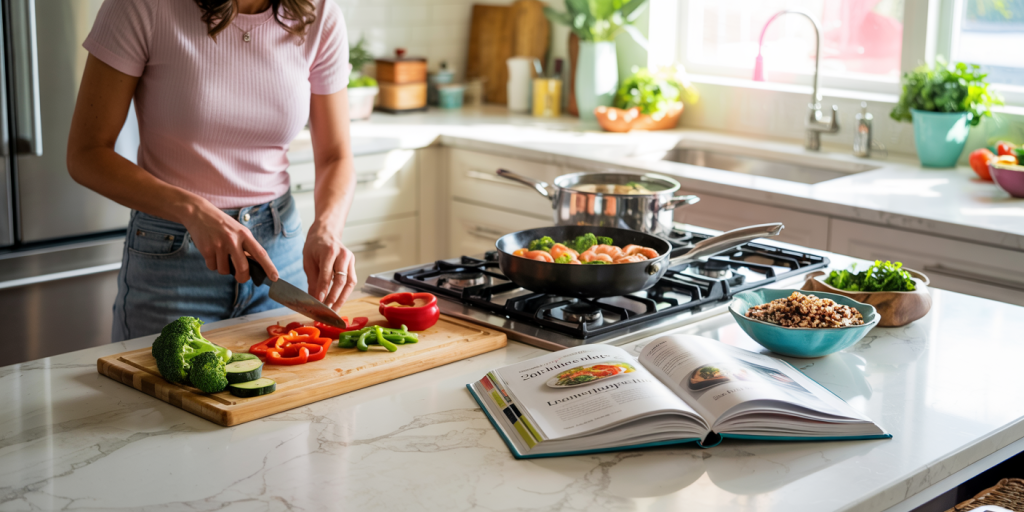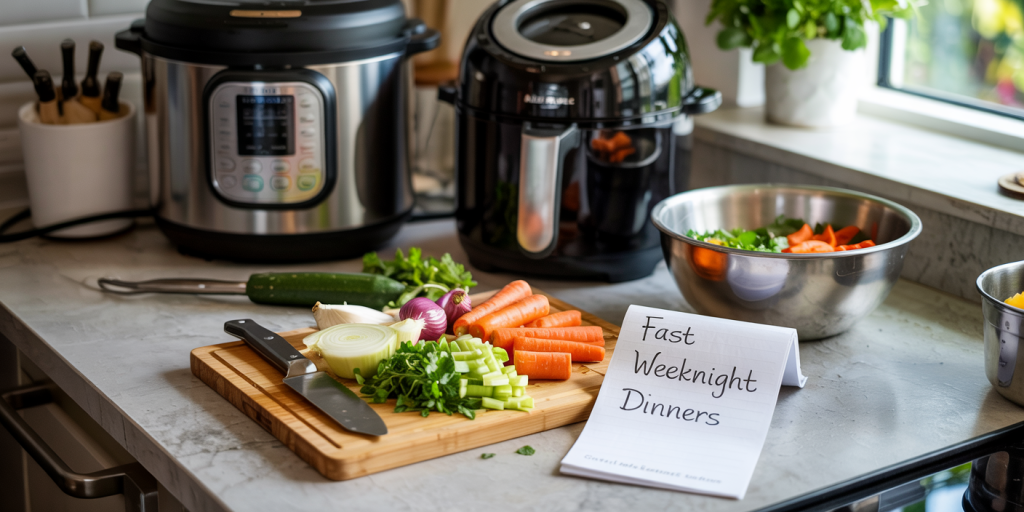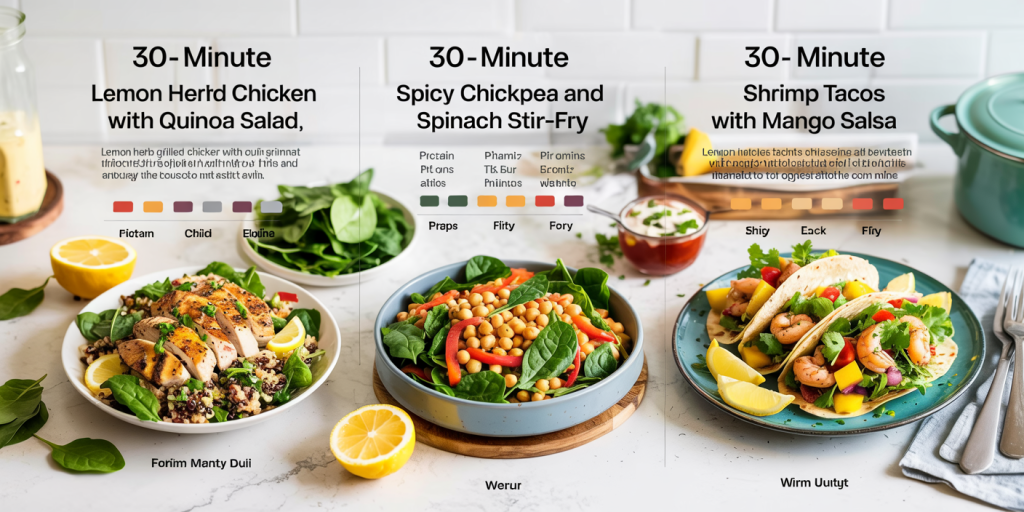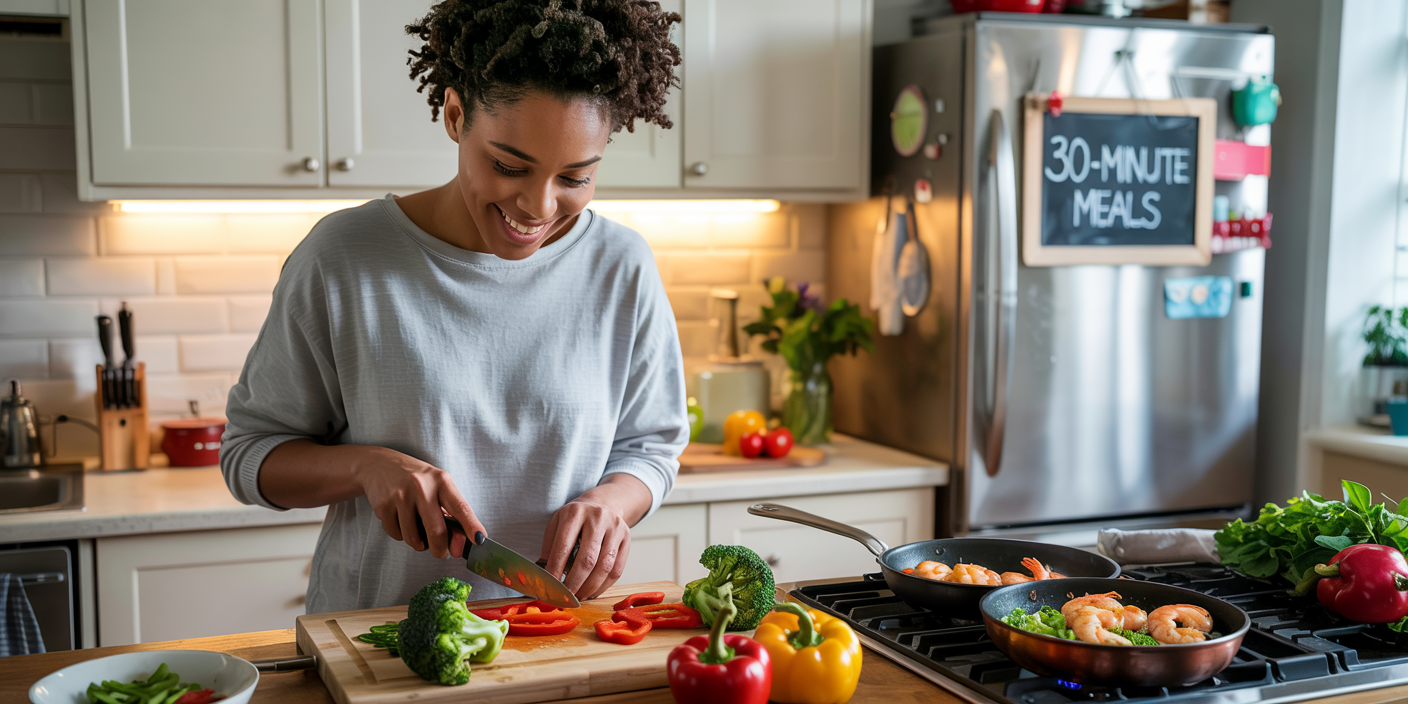In today’s fast-paced world, finding time to prepare a healthy and satisfying dinner can be challenging. According to a 2023 survey by the National Restaurant Association, 60% of households express a desire to cook at home but feel pressed for time during weeknights. This rising demand for efficient meal preparation has sparked interest in recipes that can be made in under 30 minutes. These quick dinners not only save precious time but also promote healthier eating habits by reducing reliance on processed or takeout foods. In this guide, we explore a variety of 30-minute dinner recipes, their nutritional benefits, time-saving strategies, and how these meals stack up against traditional cooking methods.
The Growing Demand for Fast, Home-Cooked Meals
The trend toward quick cooking is driven largely by changing lifestyles. With more dual-income households and busy schedules, people seek practical ways to eat well without prolonged meal prep. A 2022 Nielsen report highlighted that 70% of consumers prioritize convenience when choosing dinner options, but over 50% also want meals to be wholesome and flavorful.
Fast dinner recipes provide an ideal balance—saving time while offering control over ingredient quality and nutritional content. For example, many 30-minute dinners consist of lean proteins, fresh vegetables, and whole grains, which can contribute to better heart health and weight management. According to the American Heart Association, diets rich in such components reduce risks of cardiovascular diseases significantly.

Moreover, quick dinners can decrease food waste since they typically require fewer ingredients and allow more precise portion control. This aligns with sustainability goals that are gaining traction globally. Thus, mastering efficient dinner recipes can improve health, save money, and support environmental efforts simultaneously.
Essential Techniques for Preparing 30-Minute Dinners
Speedy cooking begins with strategic planning and use of efficient techniques. Meal preparation methods such as batch chopping, one-pot cooking, and utilizing kitchen appliances like pressure cookers or air fryers can cut down time dramatically.

Batch chopping vegetables and proteins ahead of time allows cooks to assemble meals quickly during the week. For instance, washing and slicing bell peppers, onions, and chicken breasts in advance can reduce active cooking time by 10-15 minutes per meal. Additionally, one-pot or sheet-pan recipes minimize cleanup and simplify the cooking process, making quick dinners more approachable for novice cooks.
Modern appliances further streamline meal preparation. An Instant Pot or electric pressure cooker reduces cooking times by up to 70% compared to traditional stovetop methods. Similarly, air fryers achieve crispy textures with significantly less oil and time, ideal for health-conscious individuals. Taking advantage of these tools contributes to crafting balanced and appetizing dinners within the 30-minute window.
Popular 30-Minute Dinner Recipes and Their Nutritional Profiles
Below are examples of efficient dinners that combine taste, variety, and nutrition for different dietary preferences. Each recipe can be completed in approximately half an hour or less.
1. Lemon Herb Grilled Chicken with Quinoa Salad
Grilled chicken breasts marinated in lemon, garlic, and herbs paired with a refreshing quinoa salad full of diced cucumbers, tomatoes, and feta cheese make a protein-rich meal. Chicken breast contains about 31 grams of protein per 100 grams, aiding muscle repair and satiety. Quinoa adds fiber, magnesium, and essential amino acids, enhancing overall meal quality.
2. Spicy Chickpea and Spinach Stir-Fry (Vegan)
This plant-based dish uses canned chickpeas, fresh spinach, and aromatic spices such as cumin and chili flakes. Chickpeas provide protein and fiber, supporting digestion and blood sugar regulation. Spinach is nutrient-dense, offering vitamins A, C, and K with few calories. The use of canned legumes dramatically reduces cooking time, with rinsing and stir-frying done in under 15 minutes.
3. Shrimp Tacos with Mango Salsa
Quick-cooking shrimp seasoned with paprika and lime juice complements a tangy, diced mango salsa. Shrimp offers low-fat protein and key minerals like selenium and iodine. Mango adds natural sweetness alongside vitamin C and fiber. Wrapping ingredients in corn tortillas takes just minutes, creating a light and satisfying meal.
The nutritional comparison in the following table highlights the macronutrient composition of these three recipes per serving:
| Recipe | Calories | Protein (g) | Carbohydrates (g) | Fat (g) | Fiber (g) |
|---|---|---|---|---|---|
| Lemon Herb Grilled Chicken | 450 | 42 | 35 | 9 | 5 |
| Spicy Chickpea & Spinach Stir-Fry | 380 | 18 | 50 | 6 | 12 |
| Shrimp Tacos with Mango Salsa | 420 | 35 | 40 | 8 | 6 |
These recipes showcase how diverse and nutritious quick dinners can be, accommodating different tastes and dietary needs.

Time Management and Ingredient Selection for Efficiency
Time management is critical for successful 30-minute dinners. Experts recommend organizing ingredients and tools before cooking, a practice known as mise en place. This reduces downtime and helps prevent errors or forgotten components during meal assembly.
Selecting ingredients that cook quickly or are pre-prepped can further streamline dinner preparation. For example, choosing thinly sliced meats, canned beans, frozen vegetables, and pre-washed greens can save upwards of 10 minutes per dish. Additionally, staple pantry items such as olive oil, garlic, dried herbs, and basic spices enable quick flavor enhancements without last-minute shopping.
Stocking up on versatile ingredients that work across multiple recipes encourages efficiency and reduces food waste. Ingredients like brown rice, whole-wheat pasta, and canned tomatoes can serve as foundations for numerous quick meals. According to a 2022 Consumer Reports study, households that maintain a well-stocked pantry cook dinner at home 30% more often, indicating increased control over meal timing and quality.
Comparative Analysis: 30-Minute Dinners vs. Traditional Cooking
To understand the benefits of 30-minute dinner recipes, it’s useful to compare them against more traditional, multi-step cooking approaches that often require an hour or more.
| Aspect | 30-Minute Dinners | Traditional Cooking |
|---|---|---|
| Average Prep & Cook Time | 20-30 minutes | 60+ minutes |
| Ingredient Complexity | Focus on simple, fewer ingredients | Often involves complex sauces, multiple components |
| Nutritional Control | Higher, due to fresh ingredients and lean proteins | Variable; sometimes higher in fat and sodium |
| Clean-up Time | Reduced (one-pot or sheet-pan) | Longer, multiple pots/pans |
| Suitability for Beginners | High, due to straightforward steps | Moderate to low, often more techniques are required |
| Cost Efficiency | Generally lower due to simpler ingredients | Can be higher depending on recipe |
This table illustrates that 30-minute dinners offer tangible advantages in speed and ease, making them accessible without compromising nutrition or flavor. Traditional meals may lend themselves better to special occasions or elaborate culinary expressions, but quick dinners better suit weekday routines.
Future Perspectives: Innovations in Quick Dinner Solutions
Looking ahead, the intersection of technology, nutrition science, and culinary arts promises exciting advancements in quick dinner preparation. Innovations such as AI-powered smart kitchen appliances can suggest optimized meal plans based on available ingredients and dietary goals, reducing decision fatigue and meal prep times further.
Meal kits focused on 30-minute dinners have already gained popularity, with companies projecting 15% annual growth in this segment through 2027. These kits balance convenience and freshness, offering pre-portioned ingredients alongside easy-to-follow instructions that can transform cooking dynamics for busy households.
Additionally, ongoing research into nutrient-preserving cooking methods will enhance the health benefits of quick meals. Methods like sous-vide combined with faster cooking times could soon become mainstream, allowing detailed flavor development with minimal time investment.
Sustainability efforts also encourage use of local, seasonal, and organic produce in fast dinner recipes, supported by smart supply chain management enabling rapid access to fresh ingredients. This trend not only improves health outcomes but also fosters environmental stewardship. Ultimately, embracing these advancements will help consumers maintain balanced diets despite demanding schedules, solidifying the role of 30-minute dinners in modern culinary culture.
—
By integrating practical cooking approaches, balanced nutrition, and future innovation, 30-minute dinner recipes serve as powerful tools to enhance both lifestyle and wellbeing. Whether preparing lean grilled chicken, a plant-based stir-fry, or seafood tacos, quick home-cooked dinners represent a sustainable and health-conscious solution for busy individuals and families.

Deixe um comentário